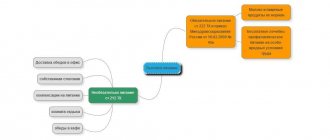Normative base
Article 195.1 of the Labor Code of the Russian Federation states that a professional standard is usually understood as a specialized standard, which includes a list of necessary characteristics on the basis of which an employee fulfills obligations. This segment of the legislation was discussed in 2013, but over time, regular adjustments and modifications were made, which led to the subsequent implementation of these standards only in 2020. Since 2020, the legislator has obliged commercial organizations to be guided by professional standards for specific industries (if they have already been developed and approved).
To be fair, it is worth noting that there is no specially developed professional standard for the general director. This phenomenon is due to the fact that similar positions at enterprises are occupied by completely different specialists, and it would be wrong to lump all specialists with the same brush. But a number of standards make some reference to professionals working in specific areas, while “CEO” is a general concept. So the sole manager of the highest level can be selected from:
- specialists in the field of procurement (No. 558 approved within the framework of Order of the Ministry of Labor No. 625n dated September 10, 2015);
- masters in the field of personnel management (No. 559, the document was approved by Order from the Ministry of Labor and Social Protection No. 691n dated October 6, 2015);
- managers carrying out direct job responsibilities in the IT field, document No. 149, which was approved by Order of the Ministry of Labor and Social Protection No. 716n dated October 13, 2014;
- workers who meet the professional standard No. 31, intended specifically for specialists engaged in the field of technical quality control of products (the document was approved by Order No. 292n dated October 31, 2014);
- employees recruited in accordance with professional standard No. 802, developed for specialists managing the quality of commodity items in the field of aircraft manufacturing (approved by order document No. 1112n dated December 22, 2015);
- team members whose qualifications meet the requirements of document No. 704 for craftsmen managing the supply process in the field of aircraft construction (approved by order No. 1055n dated December 21, 2015);
- employees whose work falls under standard No. 581, intended for a specialist organizing sports events (approval - Order of the Ministry of Labor No. 798n dated October 28, 2015).
The professional standards given in the list regulate the activities of not only managers, but also their deputies.
Documents for download (free)
- Purchasing Specialist
- Aviation Supply Chain Management Specialist
- HR Specialist
- Information Technology Manager
- Product quality control specialist
- Quality management specialist in aircraft manufacturing
- Head of a catering company
- Head of social service organization
- Head of an organization operating in the field of physical culture and sports
- Head manager of a hotel complex of a hotel chain
Features of the professional standard for HR director
Based on Order of the Ministry of Labor of the Russian Federation No. 691-n dated October 6, 2015. The professional standard “Human Resources Management Specialist” was approved. This standard provides for the following positions:
- HR specialists;
- heads of human resources departments.
The main task of the HR director is to ensure an effective labor process to achieve goals in the interests of the enterprise.
The professional standard assumes the following requirements for the HR director:
- at least 5 years of work experience as a manager in a similar field;
- higher education and a certificate in courses of additional training programs.
The main tasks that an HR manager must perform are:
- Ensuring the functioning of the operational management system by subordinates.
- Maintaining necessary documentation and reporting on employee management.
- Providing strategic management to subordinates.
It is also typical for the head of the HR department to perform the following functions:
- establish communication links between employees of the organization;
- implement a personnel management strategy;
- adhere to the rules of etiquette when communicating with colleagues;
- represent the director of the company in various negotiations if necessary;
- maintaining cost estimates for subordinates;
- putting forward their proposals for optimizing the activities of employees.
Why are professional standards needed for management personnel?
The scope of application of such documentation is the direct labor activity of the enterprise’s employees. The text part of the document describes the following points:
- required knowledge and skills;
- availability of full compliance with the existing qualification level;
- educational conditions;
- employer requests regarding existing experience.
The development of professional standards is carried out in accordance with a specific industry of production activity. For example, documents intended for directors and subordinates are identical. The basic difference relates to the correspondence between two categories of employees, which include managers and employees at unequal levels. So, for example, for an ordinary employee the list of requirements will be smaller than for a manager.
Who is responsible for the development and approval of the professional standard?
The development and approval of professional standards are not always carried out by the same persons. The Ministry of Labor of the Russian Federation is responsible for professional standards, but it is not a direct developer and only coordinates this process in accordance with Decree of the Government of the Russian Federation No. 23 of January 22, 2013 “On the Rules for the development and approval of professional standards.” Draft professional standards are developed by interested non-profit organizations, for example:
- employers and their associations;
- professional communities;
- self-regulatory organizations.
At the same time, various educational organizations are involved in the project development process, which train specialized specialists. The Ministry of Labor approves a list of labor functions that should be described in professional standards first of all, starting from the priority directions of economic development.
Professional standards are being developed using federal budget funds. If an employer needs a professional standard with a labor function that is not described in the general list, then he can begin to develop it on his own initiative and, accordingly, at his own expense.
After development, the project is discussed with interested non-profit organizations. Next, the project is submitted for consideration to the Ministry of Labor of the Russian Federation. If all formalities during its development have been observed, then the stage of public discussions begins, followed by its examination by the National Council and final approval.
Scope of application and mandatory use for managers
There are plenty of areas in which the use of professional standards is required:
- organizing training for directors and deputies;
- carrying out certification activities;
- supplying the organization with highly qualified management personnel;
- simplifying the understanding of tariff categories;
- ensuring high quality of management processes.
The mandatory application of standards is stipulated in Art. 57 Labor Code of the Russian Federation.
Since the documents have not been developed for all areas of activity, managers can use generally accepted standards or develop their own standard based on the form approved by Order of the Ministry of Labor No. 147n.
What is a professional standard and how is it used?
Due to recent changes in the legislative framework, the concept of “professional standard” has appeared in labor legislation, denoting a set of requirements imposed on an employee that are necessary for him to be allowed to perform a certain type of activity. Professional standards are replacing qualification reference books for positions of employees and workers (ECTS and EKS).
You can find more complete information on the topic in ConsultantPlus. Full and free access to the system for 2 days.
The job characteristics used in qualification reference books from 20-30 years ago no longer meet modern labor market requirements. And the approach to setting qualification requirements itself has changed, so it was decided to introduce a new system that defines all possible labor functions.
The work on drawing up professional standards has just begun, and their use in companies and enterprises in most cases is purely advisory. It is mandatory to apply professional standards only in two cases:
- if this is expressly stated in the law or other regulatory act;
- if an employee performing a labor function specified in the professional standard occupies a position that gives the right to benefits or compensation or involves the imposition of any restrictions at the legislative level.
Thus, first of all, those employers for whom the use of qualification directories was required will have to implement professional standards. However, there is one nuance here: if previously only the job title and rather conventionally described qualification requirements mattered, now the qualification requirements have received more specifics - and this will have to be taken into account.
Job responsibilities
The document includes the following fundamental sections. The first is general information. The next point is the functional map. It includes a detailed description of the generalized functionality of the specialist. The next stage is the characterization of labor functions. This is the main part of the standard. It includes a detailed description of the options with the obligatory indication of the official name and other possible job titles, a set of requirements for education, experience, level of preparedness, and specific job functions of the general director. The fourth stage is a description of the developers of the professional standard, i.e., the persons directly involved in the development of the document.
The direct functional responsibilities of the specialist include the following areas (based on the job description and the EKS handbook):
- organizing meetings with the founders of the enterprise;
- conducting seminars and presentations, planning meetings with subordinate specialists;
- regulation of the work of all parts of the organization;
- execution of tasks received from immediate superior management or business owners;
- regular analysis and assessment of goods/services/works of the enterprise for compliance with state standards;
- taking part in drawing up plans for the further development of the company;
- creating a favorable microclimate in the team in order to coordinate the work of all specialists;
- use of advanced domestic and foreign experience in the development of the enterprise;
- management of economic and production activities;
- organization of effective interaction regarding all structures and links of the organization;
- ensuring the enterprise fulfills all obligations to the federal, local and regional budgets;
- hiring and dismissing employees, distributing their responsibilities, organizing training events;
- compliance with the legality of connections, the use of legal means and instruments for the purpose of financial management of the enterprise;
- protection of rights and interests of a property nature within the framework of litigation.
Qualification levels in the professional standard of a manager
The professional standard for the head of a commercial (non-profit) organization can be used in companies of various forms of ownership and includes several qualification levels (from fourth to eighth). Qualification levels in the professional standard of a manager correspond to the following areas of activity:
- fourth level - management of the activities of individual departments and management of the process of solving production problems;
- fifth level - managing the activities of departments to achieve key functional goals facing the organization;
- sixth level - management of key areas and activities of the organization, searching for ways to achieve strategic goals;
- seventh level - managing the life of the organization as a whole, choosing effective development paths;
- the eighth level is the long-term development of the organization, obtaining maximum financial returns for shareholders and other stakeholders.
The professional standard for the head of a commercial (non-profit) organization covers all types of economic activity and involves performing managerial functions in various areas - from the head of advertising and information, marketing or any other department (service, project) to managing the system of corporate relations and the organization as a whole.
Employee compliance requirements and working conditions
The director of a commercial organization must have a higher education in the field in which the enterprise operates or a university diploma in economics. In addition, employers require work experience of at least 3 years in the role of an ordinary specialist. Professional qualities include proficiency in a personal computer, accounting applications, and the specifics of the organization’s work. Among the personal qualities it is worth highlighting:
- activity;
- determination;
- ability to interact in a team;
- literacy;
- punctuality;
- resistance to stressful situations;
- hard work.
The working conditions of a specialist imply the presence of a personal office equipped with the necessary furniture, equipment, and office supplies. In addition, the specialist must be willing to travel on business trips and work outside of normal working hours.
Vocational training: Retail Cashier
Privacy Policy The Center for Further Professional Education guarantees the confidentiality of your information that you leave on our website.
In this regard, you can be sure that the information we receive about you is used only to inform you about our educational services, as well as to prepare educational services and products. Information is not transferred to third parties.
The exception is cases provided for by the legislation of the Russian Federation, as well as those described in this Privacy Policy. Scope of the Privacy Policy This Privacy Policy (hereinafter referred to as the “Policy”) was developed on the basis of Art. 24 of the Constitution of the Russian Federation, Federal Law of the Russian Federation “On Information, Informatization and Information Protection” No. 149-FZ of July 27, 2006.
(as amended on February 22, 2017), Federal Law of the Russian Federation “On Personal Data” No. 152-FZ dated July 27, 2006.
Liability for non-use
Ignoring by the director's employer the requirement to apply a professional standard entails liability in accordance with Art. 5.27 of the Code of Administrative Offenses of the Russian Federation, which is an administrative fine. Much more distressing may be the liability of deliberately appointing a director who is substandard and lacks the knowledge to lead effectively. Depending on the situation, the case may even lead to criminal proceedings.
Dismissal due to non-compliance with standard
If an employee has not passed the certification and it turns out that he does not meet the standard established for him, recertification is carried out. The last resort is dismissal.
The law prohibits the dismissal of pregnant women, persons caring for children under 3 years of age, and disabled people.
Thus, there is no single professional standard for a general director, but there are many specific documents regulating the activities of a professional in a particular field.
The application of professional standards and making adjustments to job descriptions is discussed below.
Is there a professional standard for the general director of an LLC?
From the very beginning of development, while still being not mandatory, but advisory acts, professional standards were focused on types of professional activity.
Actually, that is why they began to be used: a professional standard is a document designed to determine the required level of qualifications and establish the main labor functions of an employee who is engaged in any specific type of activity. Thus, issues of the legal form of a legal entity remain outside the field of view of the developers of the professional standard. Read us on Yandex.Zen Yandex.Zen
That is why it is at least strange to expect that a professional standard for the general director of an LLC will be adopted that concerns only LLCs, but does not affect, say, JSCs. The only thing that various LLCs have in common is the form in which they are registered. On their own, they can engage in any commercial activity that is not prohibited in Russia, requiring a variety of knowledge and qualifications from the manager.
In this case, perhaps there is a professional standard for a CEO in general? In the end, the professional standard, for example, for an accountant, also does not indicate whether this specialist works in an LLC, JSC or MUP. However, there is a catch here: you cannot manage something in the abstract. A leader must have a qualified understanding of exactly what his organization does, and organizations, as already mentioned, do completely different things. Therefore, such a professional standard does not exist even in the form of a draft.








